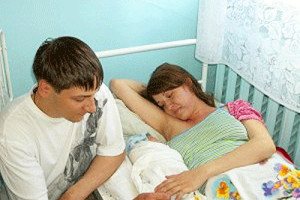Russian Fertility Rate will Continue to Fall Even if Economy Improves, Data Show

(Paul Goble – Window on Eurasia – Staunton, September 30, 2019)
Fertility rates in Russia have again fallen to the levels they were in during the 1990s, Rosstat data show, and the government assumes that when the deceive economy improves, they will go right back up. But a more careful examination of the data suggests that underlying shifts in values make that an almost impossible dream.
Yevgeny Chernyshov, an analyst for the Nakanune news agency, says that is just one of the ways in which the powers that be are deceiving themselves and seeking to others. An even more immediately obvious case of this concerns the apparent paradox that the birthrate is falling but the number of large families is increasing (nakanune.ru/articles/115513/).
But the data show that the confidence the authorities have because of the latter figure will have almost no impact on the overall fertility rate. On the one hand, large families, those with three or four children, are the product not of the current situation but the one over the last 15 years of even more. Families with three children now may have had their first long ago.
And second, and even more significant, there are too few large families to influence the overall picture. Even if there are more large families now than there were ten years ago, their share of the total population is so small that they will not make any important difference in the overall pattern of demographic decline.
But there are other more profound trends that the powers that be don’t talk about even though their own numbers show that point to a continuing decline in the number of children per woman per lifetime. One of these is the divergence between the number of children Russian say the want – 2.15 per family – and the number they expect – 1.9 – and actually have – 1.5
At present, “only 27 percent” of Russians queried about family size say they want three or more children. Seven years ago, that figure was 32 percent, Chernyshov says. And that has little to do with economics: the higher on the income pyramid Russians are, the fewer children they say they want to have and do.
Another factor suppressing fertility rates are changes in attitudes toward marriage, given that those who get married are more likely to have children than those who simply cohabit. At present, surveys show that “only 65 percent of women and 52 percent of men under 40 consider it necessary to register a first marriage.
Moreover, ever more Russians of both sexes are against marriage as such, with seven percent of women and 12 percent of men saying that now as opposed to four percent and eight percent in a survey five years ago. As a result, more are cohabiting and not having children. In 2017, 39 percent of women and 47 percent of men were in that state, nine percent and four percent higher than five years earlier.
Many women in these relationships use abortions to avoid having children and that means that if and when they do try to give birth, they face problems. According to health ministry expert Oleg Apolikhin, 77 percent of Russian women seeking to give birth have significant medical problems that can prevent them from carrying a child to term.
Yet another factor working against a recovery of Russian fertility rates whatever happens to the economy, the Nakanune expert says, is the increasing interval between the time of entry into marriage and the birth of the first child and between the birth of the first child and each succeeding one The first figure has risen from 15 months in the early 2000s to three years as of 2015-2017.
And the second from two years in the early 1990s to four years in the early 2000s to 5.5 years now. These changes and their timing show, Chernyshov continues, that “with regard to the birthrate, in first place stand not social-economic factors” as the government imagines “but purely worldview and spiritual ones” that won’t be profoundly affected by economic change.
Put in the starkest terms, he says, “in the consciousness of half of Russians, a commitment to maximum satisfaction of their sexual requirements without taking any responsibility for them [by having children] has replaced the family at the center of their thinking. And economic difficulties have only an indirect impact on this.”
[Article also appeared at windowoneurasia2.blogspot.com/2019/10/russian-fertility-rate-will-continue-to.html]
[featured image is file photo, not directly related to article subject matter]
